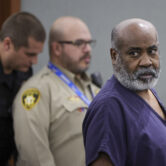PORTLAND, Ore. (CN) – Sworn statements that led to the indictment of a man accused of killing two people on an Oregon commuter train won’t become public in response to requests by local media, a judge ruled Friday.
Witnesses on a packed commuter train said that on May 25, Jeremy Christian was yelling racist slurs at two teenage girls, one of whom was wearing a hijab, when three men stepped in to stop him. Christian allegedly slashed the throats of all three, killing two. Prosecutors charged Christian with aggravated murder, attempted murder, assault and illegal use of a weapon.
The day before the murders, Christian allegedly attacked Demetria Hester, a black woman who escaped after using pepper spray to stop him. Police later charged Christian with intimidation and menacing over that incident.
Last month, Richard Kurtz, news director at local television station KOIN, asked the court to unseal the affidavits a judge relied on in issuing the search warrants that prosecutors used to gather evidence leading to Christian’s indictment.
For most of Friday’s hearing, Christian stood quietly as Greg Scholl argued on his behalf.
Scholl told Multnomah County Circuit Judge Cheryl A. Albrecht that publicizing evidence from the police investigation would make it harder for him to interview witnesses before trial and could prejudice the potential jury members.
“There are witnesses who will barely be contacted now,” Scholl said. “Once their names are revealed by a search warrant, our investigation will be made more difficult, which could affect Mr. Christian’s ability to get a fair trial.”
Kurtz’s lawyer, Judith Endejan with Garvey Schubert Barer, told Albrecht that under the First Amendment, Christian’s right to a fair trial has to be balanced with the rights of the press to access public information.
“The public has an absolute right to information about this case,” Endejan said. “It’s a violent crime that affects members of this community. The media has a duty to scrutinize the judicial process, just as individual members of the public do.”
Albrecht agreed that the Constitution called for a balance of Christian’s rights with the rights of the public, but she also said that the intense public interest in the case worried her.
“The court is concerned that these items released would result in an extra-judicial investigation that could impair both the state and the defendant in their ability to conduct an investigation,” Albrecht said.
Albrecht said she would keep the affidavits sealed for now.
“I don’t think public access is harmed by failing to disclose that document at this time,” she said.
Christian’s silence lasted until the end of the hearing, when he yelled a statement of sorts as he has done at every court appearance so far.
“If I’m a white supremacist, why did I vote for Bernie Sanders?” Christian asked the courtroom, which included Hester.
After the hearing, Hester told Courthouse News that she was she was fine, in spite of her terrifying experience the day before the killings.
“I wasn’t going out like that,” Hester said. “I’m a fighter and he’s just so afraid of anyone who fights back.”
Subscribe to Closing Arguments
Sign up for new weekly newsletter Closing Arguments to get the latest about ongoing trials, major litigation and hot cases and rulings in courthouses around the U.S. and the world.








